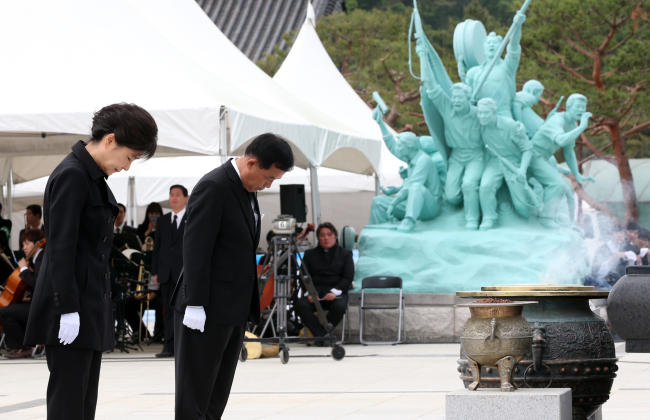GWANGJU— President Park Geun-hye on Saturday took part in honoring the 33rd anniversary of a popular movement in the southern city of Gwangju that acted as the watershed event in the nation's transition into a democracy and said the event should be used to bring about national unity.
In the official ceremony held at the May 18 National Cemetery, Park said in order for Korea to open a new future and create a dynamic country, it is imperative to overcome regional difference and past hurts.
Her presence marks the first time since 2008 that South Korea's chief executive has attended the ceremony. Park's conservative predecessor Lee Myung-bak only attended the ceremony once during his five years in office.
"The ultimate goal of democracy is to ensure the happiness of the people," she said in the speech. She vowed that the government will do all it can to strive for national unity and happiness based on the spirit of the May 18 movement.
"The goal is to merge different views from all parts of society and use this as the foundation for pushing forward national development," she said, adding that the people who made sacrifices to pave the way for democracy in the country should take the lead in this endeavor.

"It is time to change the economic paradigm from that of one oriented toward quantitative growth to qualitative growth and to expand democracy from the social and political sphere to the realm of the economy," she said, emphasizing her campaign pledge to bring about economic democracy that can curtail the power of large conglomerates and foster growth of small and medium enterprises.
The president then said she felt the loss and sorrow felt by relatives of people killed during the Gwangju democracy movement and pledged to use the spirit of the movement to transform the country into a country that people can feel proud of.
Besides Park, senior government officials, political figures, related organizations and civic groups were present at the event that started at 10 a.m.
Meanwhile, the annual ceremony that started with the laying of flowers, burning of incense and artistic performances was marred by some local groups boycotting the official gathering because the government rejected plans for participants to sing the "March for Thee" song in unison. It also lasted 25 minutes, much shorter than the 50 minutes allocated to the main ceremony in the past.
Liberal groups and those who represent victims of the pro-democracy movement had asked Seoul to include the singing of the song as part of the official program, but the proposal was rejected by the Patriots and Veterans Affairs Ministry. In a compromise, the song was sung by a choir, with those who wished to sing along allowed to do so freely.
President Park had stood while the choir sang the symbolic song and held the national flag, although she did not sing along as many others did, including ruling Saenuri Party chairman Hwang Woo-yea, main opposition Democratic Party leader Kim Han-gil and independent lawmaker Ahn Cheol-soo.
As a sign of protest, about 100 people who wanted "March to Thee" sung in unison as part of the official ceremony had staged a sit-in overnight at the Gate of Democracy, the main gate at the cemetery, and sang the song.
The song was composed in memory of the protesters and the brutal suppression they endured, and its lyrics were viewed by conservatives as being provocative. The song is sung at almost all protests organized by progressive groups and labor unions.
Another 500 liberals from the Unified Progressive Party, Progressive Justice Party, Korea Confederation of Trade Unions and student unions gathered elsewhere in Gwangju to show their anger at the government's stance on the song. (Yonhap News)



















![[Today’s K-pop] BTS pop-up event to come to Seoul](http://res.heraldm.com/phpwas/restmb_idxmake.php?idx=642&simg=/content/image/2024/04/17/20240417050734_0.jpg&u=)